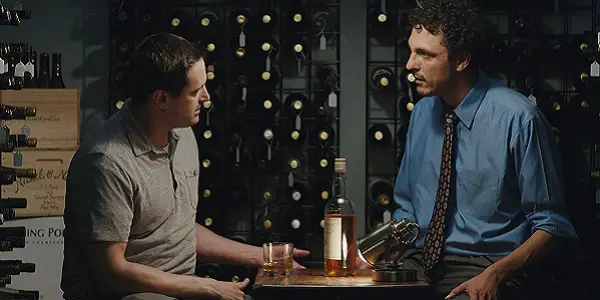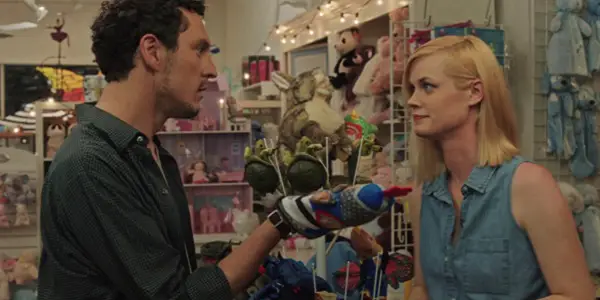ALMOST PARIS: A Story of Redemption We’ve Seen Before

Lee Jutton has directed short films starring a killer toaster,…
The success of The Big Short made it clear that, while the recent financial crisis is just barely in the rearview mirror, audiences are willing to watch movies about it. Is it a longing to get a glimpse at the faces behind the numbers? A need to be reminded that we’re not alone in our worries about paying off loans and mortgages? In the case of The Big Short, the mortgage-lending crisis – an unfunny scenario if there ever was one – was given a dose of snarky humor to make the story more palatable.
Almost Paris, a new film that tells the story of one man’s attempt to make amends for his role in the crisis, focuses more on warming hearts than eliciting laughs. Yet despite the timely story and obviously good intentions, Almost Paris is bland enough to be forgotten in the sea of other, similar feel-good flicks on basic cable.
Making Amends
Wally Marzano-Lesnevich, who also wrote the film’s script, stars as Max, a formerly powerful banker who is forced to move back home to Long Island when he is fired in the wake of the mortgage-lending crisis. Max seeks out a job as a lending officer at the local bank, only to discover that desperation has led people to apply for loans they cannot afford, and to take out their frustration and anxiety over being turned down for these loans on Max, personally. They also blame him and his Wall Street compatriots for the financial struggles that seem to plague the entire town, including all of Max’s family and friends.

Max’s parents long to sell their house and use the proceeds to visit Paris, but there are no willing buyers. It doesn’t help that Max’s sister, her husband and their young daughter recently moved in as the result of their own financial struggles. Meanwhile, Max’s best friend, Mike (Mike Sorvino), a hot-shot baseball player who never quite made the big time and now works as a bartender, is saddled with an unpayable mortgage on a condo that he and his ex-wife bought back when things were looking up for them. Max hooked them up with the financial planner that got them the mortgage, and while Mike doesn’t blame him for it, you can bet his bitter ex-wife does.
Max’s redemption tour doesn’t just involve him attempting to first explain away, then apologize for, his indirect role in everyone’s financial difficulties. It also includes attempts to woo Ellie (Abigail Hawk), a beautiful toy store owner who repeatedly refuses to go out with Max until he finally wears her down in a manner that is supposed to be sweet but feels somewhat like harassment. She helps Max finally figure out a way to give back to his family and friends without damaging their pride.
Unfortunately Familiar
Almost Paris is the debut feature from director Domenica Cameron-Scorsese; yes, she’s his daughter, and no, that shouldn’t factor into any criticism of the film. Yet one cannot help but be reminded that the director is the daughter of Hollywood royalty every time the film’s portrayal of regular middle-class folks rings way too clichéd to be true. Has Cameron-Scorsese ever even met someone with a mortgage, let alone someone who can’t pay theirs? Watching Almost Paris, it certainly doesn’t feel like it.

It isn’t all the fault of the director, of course, even as one cringes at the stiff, stagey line readings coaxed out of the majority of the cast. Ironically, the actor who gives the most natural performance in Almost Paris is the one responsible for the poor dialogue that the rest of the cast struggles with throughout.
Marzano-Lesnevich manages to make prodigal son Max a sympathetic character even as he divulges all of the crooked tricks he and others of his ilk engaged in on Wall Street (and, as previously noted, engaged in some questionable courtship tactics), but his script is far too derivative of other, better stories of redemption that we’ve seen before. Every single character feels like an archetype pulled from a screenwriting textbook, and attempts at humor via 1990’s nostalgia (primarily focused on a Friends-themed porno) and the middle-aged characters’ apparent inability to understand technology (please, you know what Twitter is) fall flat. The film’s surprising and sweet final scene is its own kind of redemption, but it’s not enough to make Almost Paris anything close to memorable.
Conclusion: Almost Paris
Despite an admittedly heartwarming message about not putting a price tag on ways to make others happy, there is very little to take away from Almost Paris. You’ve seen this one before, albeit better.
What do you think? Does a film about the effects of the financial crisis on average Americans sound timely enough to be interesting? Share your thoughts in the comments below.
Almost Paris was released in the U.S. on January 9, 2018. You can find more international release dates here.
Does content like this matter to you?
Become a Member and support film journalism. Unlock access to all of Film Inquiry`s great articles. Join a community of like-minded readers who are passionate about cinema - get access to our private members Network, give back to independent filmmakers, and more.
Lee Jutton has directed short films starring a killer toaster, a killer Christmas tree, and a not-killer leopard. Her writing has appeared in publications such as Film School Rejects, Bitch: A Feminist Response to Pop Culture, Bitch Flicks, TV Fanatic, and Just Press Play. When not watching, making, or writing about films, she can usually be found on Twitter obsessing over soccer, BTS, and her cat.













